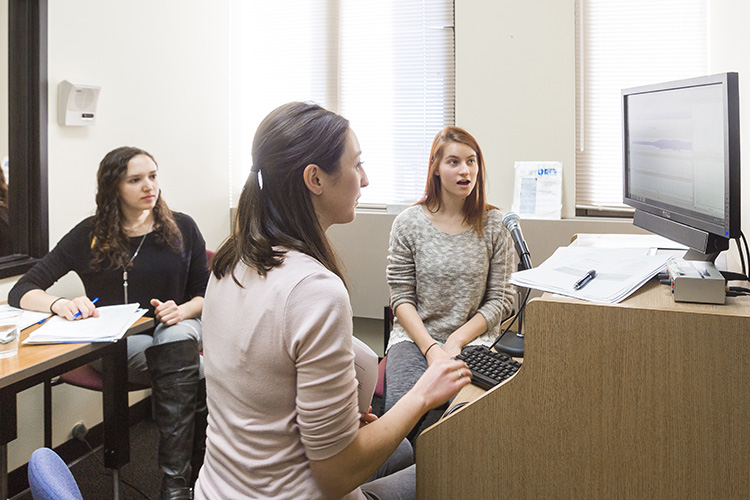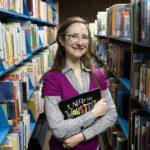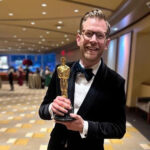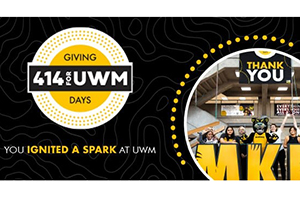Students in science and the arts don’t cross paths often, but when they do, that meeting can provide a valuable learning experience for everyone involved.
UWM’s Department of Communication Sciences and Disorders hosted a voice clinic for Peck School of the Arts vocal performance students in February. It is the first time the two departments have come together to hold a clinic for UWM students, but they plan on continuing the relationship.
“It was wonderful to bring these two groups of students together who have so much in common in their academic interests but know nothing about what the other does,” said Caitlin Croegaert-Koch, clinical assistant professor in UWM’s Department of Communication Sciences and Disorders. “There was an energy with students on both sides, I think, to learn from each other.”
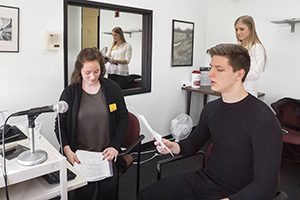
The Communication Sciences graduate students conducted voice evaluations on undergraduate and graduate vocal performance students in the Peck School.
“I think it’s especially cool to work with people who are in the music department,” said Chana Halpern, a Communication Sciences and Disorders graduate student. Students do not typically get to work with vocal performers in a clinical environment as part of their education.
Each vocalist’s performance was measured and compared to normative vocal performance data. The clinic looked at categories such as voice quality, resonance, vocal range and respiration. Performers whose vocals parameters deviate far from the norm are referred back for more extensive testing. The hard-data approach to vocal health provided a concrete assessment model for students to learn from.
Voice is a specialty area in the speech pathology profession, said Croegaert-Koch. For that reason, not every speech pathologist is comfortable working with clients who have voice disorders. Building familiarity with the practice gives UWM students, such as Halpern and Emma Saunders, a leg up when beginning their careers.
“I think the voice clinic really shows us how to use these skills in the medical field,” said Saunders. “If we end up wanting to go into private practice that does vocal therapy, we can use this as experience for it, which a lot of people don’t have.”
The voice clinic gave Peck School students valuable feedback, too. Jason Martin, a vocal performance major in his final semester, learned that he has a louder-than-average voice and collapsed posture when performing vocally – notes that reinforced points from his vocal lessons.
“It will definitely broaden my awareness and help me prevent vocal injuries in the future,” he said. “I think it’s extremely important, so I’m happy I was able to do this, (and I’m glad) that this was available to other singers in the Peck School of the Arts.”
Gabrielle Hass, a master’s of music student, found the experience beneficial as well. Hass had been to an ear, nose and throat specialist to evaluate her voice health, but this was the first time she had completed a comprehensive vocal examination. Like Martin, Hass attended the clinic primarily for health reasons. The experience provided her with a baseline performance analysis that she can use to compare her vocal health against other vocalists and herself. However, she also saw value in another aspect of the clinic.
“We’re helping out each other,” Hass said. “They’re giving me a baseline, and I’m showing them how to work with a vocal professional, which is something a lot of people in this field will end up doing at least a couple times.”
The Speech and Language Clinic is open year-round to all UWM students, not just vocalists, and the services require a minimal fee to offset the costs of materials and equipment and vary based on clients’ needs.
“Students who maybe had received speech therapy in the past for a stuttering issue, or something like that, who could just use a tune-up,” Croegaert-Koch said, “we want them to know that we’re here if they want to come to us.”
Anyone interested in the clinic’s services or who wants more information can call 414-229-4351 or email kingmciv@uwm.edu.
